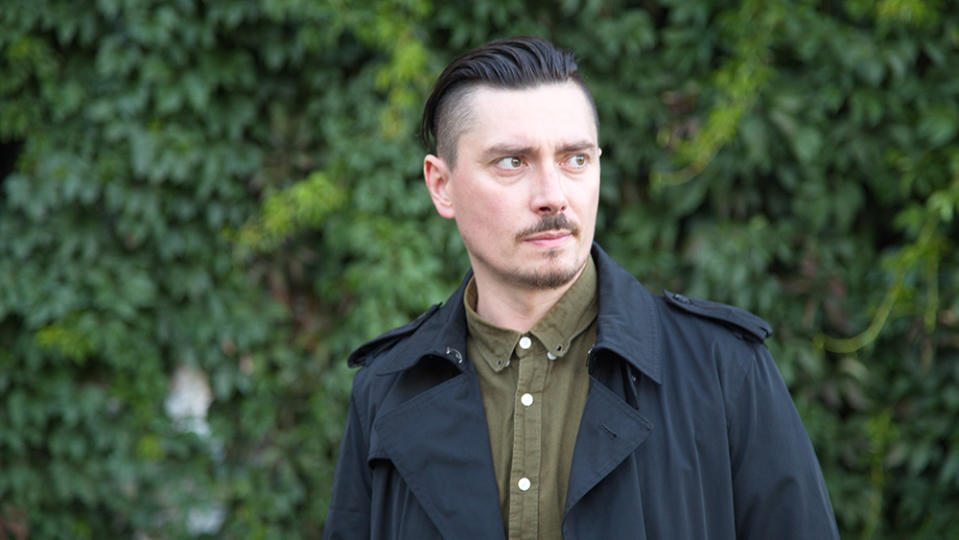‘Pamfir’ Helmer Dmytro Sukholytkyy-Sobchuk Warns Against Beatification of War

In Dmytro Sukholytkyy-Sobchuk’s Cannes title “Pamfir,” marking his feature debut, the carnival is fast approaching. His protagonist (Oleksandr Yatsentyuk) finally returns home, ready to do better this time. But when his child runs into trouble and there is no money, as always, there is no way but back.
With Indie Sales on board and produced by Bosonfilm, “Pamfir” is a co-production between Les Films d’Ici (France), Madants (Poland), Quijote Films (Chile), Mainstream Pictures (Ukraine), Wady Films (Luxembourg), Moderator Inwestycje (Poland), Studio Orlando (France) and Soilfilms (Germany).
More from Variety
“This carnival, malanka, is specific to western Ukraine. It’s like a game – there are rules,” says Sukholytkyy-Sobchuk.
While people sing, dance and fight, they also stage plays, returning to the concept of holy sacrifice.
“When it comes to this celebration, there is a sense of loss. You lose something and then later, it rises again. A bit like in Christianity or a bit like with our character. You don’t really know him. He is gone and then he comes back.”
He wanted the viewers to feel “like tourists” in his film, he says.
“All we can do is follow. Everywhere he goes, it feels like he’s inside of a tunnel. Even in his house, he doesn’t have a lot of space. He goes through all these obstacles and then he has to make a deal with his conscience.”
Pamfir’s willingness to risk his life and perhaps sacrifice himself for his family “hits differently” now, says Sukholytkyy-Sobchuk, after the Russian invasion of Ukraine.
“All of a sudden, there is this connection to what is happening now, making it seem like some kind of premonition. When I was making the film, we didn’t expect this huge escalation.”
The festival has shown interest in the film long before the invasion started, however, with Sukholytkyy-Sobchuk especially grateful to Paolo Moretti, Directors’ Fortnight artistic director who will step down after this year’s edition.
“We are glad that nobody was doing us any favors. It’s an honor to be here, especially with a film that’s not directly speaking about war,” he says. Also commenting on the inclusion of “Tchaikovsky’s Wife” in the main competition, a decision that has been ruffling feathers within the Ukrainian film industry for a while now, especially those gathered in Cannes.
“Cannes doesn’t realize that by selecting this film they are providing a service: to Russia and to their propaganda. And make no mistake, they will use it.”
His own cinema might also change now, he says. Like many other Ukrainian filmmakers, Sukholytkyy-Sobchuk has been devoting his time to capturing the conflict, currently developing multiple documentaries, including a collaboration with The New Yorker.
“Our economic situation won’t provide us with many opportunities for making fiction films, at least not anytime soon. But we need to figure out how to make them,” he says.
“Over the course of the next few years, we will start to reflect on what has happened to us. There will be stories coming from all generations, also from people who are now experiencing it all as small kids.”
While it’s crucial to talk about injustice and tragic consequences of the war, Sukholytkyy-Sobchuk is wary of its sanitized depictions, he adds.
“All you need to do is take a look at Soviet cinema and how it was approaching World War II. There were great movies made at that time, masterpieces, but how many of them were really critical?,” he wonders.
“They would beatify Soviet soldiers, like in [Larisa Shepitko’s 1977 film] ‘The Ascent.’ That protagonist, he was almost a saint. It created this myth of an innocent Russian soldier. But how many of them have raped and killed?”
Sukholytkyy-Sobchuk worries that Russian cinema will try to tackle the current invasion next, he says.
“Russia is already trying to invoke the ghost of Nazism in Ukraine. They are calling it a ‘holy war,’ and they certainly know how to use cinema as a part of their propaganda machine. I am sure they will start releasing films showing a deformed version of these events as soon as they can, featuring some ‘heroic’ characters again,” he adds.
“When they came to Ukraine, Russian soldiers were stealing people’s washing machines. How heroic was that?!”

Courtesy of Directors' Fortnight
Best of Variety
Sign up for Variety’s Newsletter. For the latest news, follow us on Facebook, Twitter, and Instagram.

